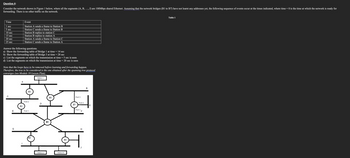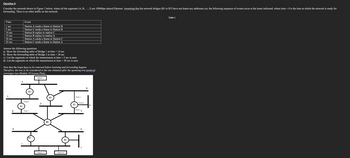Consider the network shown in Figure 1 below, where all the segments (A, B, ..., J) are 100Mbps shared Ethernet. Assuming that the network bridges (B1 to B7) have not learnt any addresses yet, the following sequence of events occur at the times indicated, where time-0 is the time at which the network is ready for forwarding.There is no other traffic on the network. Time 5 sec 10 sec 15 sec 20 sec 25 sec Event Station A sends a frame to Station B Station C sends a frame to Station B Station B replies to station C Station B replies to station A Station A sends a frame to Station C Station C sends a frame to Station A Answer the following questions. a) Show the forwarding table of Bridge 1 at time - 14 sec b) Show the forwarding table of Bridge 3 at time-28 sec c) List the segments on which the transmission at time - 5 sec is seen d) List the segments on which the transmission at time-20 sec is seen Note that the foons have to be removed before leaming and Expanding happen Table 1
Consider the network shown in Figure 1 below, where all the segments (A, B, ..., J) are 100Mbps shared Ethernet. Assuming that the network bridges (B1 to B7) have not learnt any addresses yet, the following sequence of events occur at the times indicated, where time-0 is the time at which the network is ready for forwarding.There is no other traffic on the network. Time 5 sec 10 sec 15 sec 20 sec 25 sec Event Station A sends a frame to Station B Station C sends a frame to Station B Station B replies to station C Station B replies to station A Station A sends a frame to Station C Station C sends a frame to Station A Answer the following questions. a) Show the forwarding table of Bridge 1 at time - 14 sec b) Show the forwarding table of Bridge 3 at time-28 sec c) List the segments on which the transmission at time - 5 sec is seen d) List the segments on which the transmission at time-20 sec is seen Note that the foons have to be removed before leaming and Expanding happen Table 1
Database System Concepts
7th Edition
ISBN:9780078022159
Author:Abraham Silberschatz Professor, Henry F. Korth, S. Sudarshan
Publisher:Abraham Silberschatz Professor, Henry F. Korth, S. Sudarshan
Chapter1: Introduction
Section: Chapter Questions
Problem 1PE
Related questions
Question
Please provie and explanation to your answers

Transcribed Image Text:Question 4:
Consider the network shown in Figure 1 below, where all the segments (A, B, …., J) are 100Mbps shared Ethernet. Assuming that the network bridges (B1 to B7) have not learnt any addresses yet, the following sequence of events occur at the times indicated, where time = 0 is the time at which the network is ready for
forwarding.There is no other traffic on the network.
Time
1 sec
5 sec
10 sec
15 sec
20 sec
25 sec
Answer the following questions.
a) Show the forwarding table of Bridge 1 at time = 14 sec
b) Show the forwarding table of Bridge 3 at time = 28 sec
c) List the segments on which the transmission at time = 5 sec is seen
d) List the segments on which the transmission at time = 20 sec is seen
Note that the loops have to be removed before learning and forwarding happen.
Therefore, the tree to be considered is the one obtained after the spanning tree protocol
converges (see Module 10 Lesson Plan).
с
E
G
Event
Station A sends a frame to Station B
Station C sends a frame to Station B
Station B replies to station C
Station B replies to station A
Station A sends a frame to Station C
Station C sends a frame to Station A
A
B2
B3
Port 2
Port 1
B6
Station C
D
Station A
B1
B5
Station B
B4
B7
Port 3
Port 2
Port 1
F
H
B
K
Table 1
Expert Solution
This question has been solved!
Explore an expertly crafted, step-by-step solution for a thorough understanding of key concepts.
This is a popular solution!
Trending now
This is a popular solution!
Step by step
Solved in 4 steps

Follow-up Questions
Read through expert solutions to related follow-up questions below.
Follow-up Question
Need more clarification about this question all part would really appreciate if you could provide the statement why is you table correct with the epxlxnation

Transcribed Image Text:Question 4:
Consider the network shown in Figure 1 below, where all the segments (A, B, …., J) are 100Mbps shared Ethernet. Assuming that the network bridges (B1 to B7) have not learnt any addresses yet, the following sequence of events occur at the times indicated, where time = 0 is the time at which the network is ready for
forwarding.There is no other traffic on the network.
Time
1 sec
5 sec
10 sec
15 sec
20 sec
25 sec
Answer the following questions.
a) Show the forwarding table of Bridge 1 at time = 14 sec
b) Show the forwarding table of Bridge 3 at time = 28 sec
c) List the segments on which the transmission at time = 5 sec is seen
d) List the segments on which the transmission at time = 20 sec is seen
Note that the loops have to be removed before learning and forwarding happen.
Therefore, the tree to be considered is the one obtained after the spanning tree protocol
converges (see Module 10 Lesson Plan).
с
E
G
Event
Station A sends a frame to Station B
Station C sends a frame to Station B
Station B replies to station C
Station B replies to station A
Station A sends a frame to Station C
Station C sends a frame to Station A
A
B2
B3
Port 2
Port 1
B6
Station C
D
Station A
B1
B5
Station B
B4
B7
Port 3
Port 2
Port 1
F
H
B
K
Table 1
Solution
Follow-up Question
Please provide the tables based on the question and expli the answer clearly with steps.

Transcribed Image Text:Question 4:
Consider the network shown in Figure 1 below, where all the segments (A, B, …., J) are 100Mbps shared Ethernet. Assuming that the network bridges (B1 to B7) have not learnt any addresses yet, the following sequence of events occur at the times indicated, where time = 0 is the time at which the network is ready for
forwarding.There is no other traffic on the network.
Time
1 sec
5 sec
10 sec
15 sec
20 sec
25 sec
Answer the following questions.
a) Show the forwarding table of Bridge 1 at time = 14 sec
b) Show the forwarding table of Bridge 3 at time = 28 sec
c) List the segments on which the transmission at time = 5 sec is seen
d) List the segments on which the transmission at time = 20 sec is seen
Note that the loops have to be removed before learning and forwarding happen.
Therefore, the tree to be considered is the one obtained after the spanning tree protocol
converges (see Module 10 Lesson Plan).
с
E
G
Event
Station A sends a frame to Station B
Station C sends a frame to Station B
Station B replies to station C
Station B replies to station A
Station A sends a frame to Station C
Station C sends a frame to Station A
A
B2
B3
Port 2
Port 1
B6
Station C
D
Station A
B1
B5
Station B
B4
B7
Port 3
Port 2
Port 1
F
H
B
K
Table 1
Solution
Knowledge Booster
Learn more about
Need a deep-dive on the concept behind this application? Look no further. Learn more about this topic, computer-science and related others by exploring similar questions and additional content below.Recommended textbooks for you

Database System Concepts
Computer Science
ISBN:
9780078022159
Author:
Abraham Silberschatz Professor, Henry F. Korth, S. Sudarshan
Publisher:
McGraw-Hill Education

Starting Out with Python (4th Edition)
Computer Science
ISBN:
9780134444321
Author:
Tony Gaddis
Publisher:
PEARSON

Digital Fundamentals (11th Edition)
Computer Science
ISBN:
9780132737968
Author:
Thomas L. Floyd
Publisher:
PEARSON

Database System Concepts
Computer Science
ISBN:
9780078022159
Author:
Abraham Silberschatz Professor, Henry F. Korth, S. Sudarshan
Publisher:
McGraw-Hill Education

Starting Out with Python (4th Edition)
Computer Science
ISBN:
9780134444321
Author:
Tony Gaddis
Publisher:
PEARSON

Digital Fundamentals (11th Edition)
Computer Science
ISBN:
9780132737968
Author:
Thomas L. Floyd
Publisher:
PEARSON

C How to Program (8th Edition)
Computer Science
ISBN:
9780133976892
Author:
Paul J. Deitel, Harvey Deitel
Publisher:
PEARSON

Database Systems: Design, Implementation, & Manag…
Computer Science
ISBN:
9781337627900
Author:
Carlos Coronel, Steven Morris
Publisher:
Cengage Learning

Programmable Logic Controllers
Computer Science
ISBN:
9780073373843
Author:
Frank D. Petruzella
Publisher:
McGraw-Hill Education